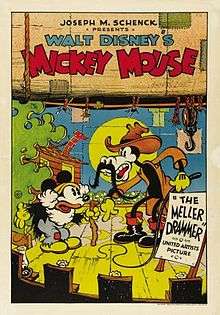Mickey's Mellerdrammer
| Mickey's Mellerdrammer | |
|---|---|
 | |
| Directed by | Wilfred Jackson |
| Produced by | Walt Disney |
| Written by |
Wilfred Jackson Walt Disney |
| Starring |
Pinto Colvig Walt Disney Marcellite Garner Billy Bletcher |
| Music by | Oliver Wallace |
| Cinematography |
Wilfred Jackson Walt Disney |
| Edited by |
Wilfred Jackson Walt Disney |
Production company | |
| Distributed by | United Artists |
Release dates |
|
Running time | 8 Minutes |
| Country | United States |
| Language | English |
Mickey's Mellerdrammer is a 1933 American animated short film produced by Walt Disney Productions and released by United Artists. The title is a corruption of "melodrama", thought to harken back to the earliest minstrel shows, as a film short based on Harriet Beecher Stowe's anti-slavery novel Uncle Tom's Cabin and stars Mickey Mouse and his friends who stage their own production of the novel.
The cartoon shows Mickey Mouse and some of the other characters dressed in blackface with exaggerated, orange lips; bushy, white sidewhiskers made out of cotton; and his now trademark white gloves.
Plot
In Mickey's Mellerdrammer, Mickey Mouse, Minnie Mouse, Goofy (known then as Dippy Dawg) and others present their own low budget light-hearted rendition of the 19th century Tom Shows for a crowd in a barn converted into a theater for the occasion.
Horace Horsecollar plays the white slave owner Simon Legree. Minnie plays the young white girl Eva. Mickey plays old Uncle Tom with cotton around his ears and chin, and the young slave girl Topsy. Clarabelle Cow plays the slave woman Eliza. Goofy plays the production stage hand.
The cartoon opens with Mickey and Clarabelle Cow in their dressing rooms applying blackface makeup for their roles. The cartoon is much more focused on the Disney characters' efforts to put on the play, than an animated version of Uncle Tom's Cabin. The cartoon contains many images of Mickey and the other characters using makeshift props as sight gags.
The cartoon closes with the characters coming out for a bow, and Horace Horsecollar's character is pelted with rotten tomatoes. When Goofy shows his face from behind the stage, he is hit with a chocolate pie, leaving him in what appears to be blackface.
Ethnic stereotyping
Stereotyped characterizations of black people were then common, and 'revealed a hostility to emancipation.'[1] Mickey's Mellerdrammer was one of many films and cartoons of its era that referenced Uncle Tom's Cabin, and has been cited as 'particularly notable.'[2] Henry Louis Gates Jr., wondered how the cartoon evaded censorship of miscegenation, given that Mickey and Minnie portray Tom and Eva, and are "as they say, an item, and unmistakably so." (Additionally, Mickey is seen cross-dressing in the role of Topsy.)[3]
In the beginning of this short, Clarabelle Cow appears in her dressing room applying lantern soot to her face and leaving an exaggerated area around her lips white. Mickey Mouse then takes a more “comical” approach to applying the makeup: He puts a firecracker in his mouth and lights it, which explodes, causing the ashes to paint his face black while leaving a large area around his lips white.[4] Mickey’s bushy side whiskers and white gloves are also a representation of the use of blackface.[5]
References
- ↑ Connolly, Paula T. Slavery in American Children's Literature, 1790-2010, 235. University of Iowa Press, 2013
- ↑ Reynolds, David S. Mightier than the Sword: Uncle Tom's Cabin and the Battle for America, 243. W. W. Norton & Company
- ↑ Reynolds, 244
- ↑ https://www.youtube.com/watch?v=Dw06K0dG1Zw
- ↑ http://www.omgfacts.com/lists/11266/Mickey-Mouse-s-trademark-white-gloves-have-racist-origins[]